Diplomatic Bluebook 2020
Opening Spetial Feature
Free and Open Indo-Pacific (FOIP)
The Indo-Pacific region, which stretches from the Asia-Pacific across the Indian Ocean to the Middle East and Africa, is the core of the world's vitality and supports more than half of the world's population. At the same time, it is a region which has seen complex power relations at work and has experienced drastic shifts in the regional power balance. The region faces a variety of threats, such as piracy, terrorism, proliferation of weapons of mass destruction, natural disasters, and illegal fishing.
The core idea of the Free and Open Indo-Pacific (FOIP) concept is to establish a rules-based international order and consolidate principles such as free trade, freedom of navigation, and the rule of law, which are essential for the stability and prosperity of the region. Together with like-minded countries that share the vision of FOIP, Japan is vigorously leading efforts to this end.
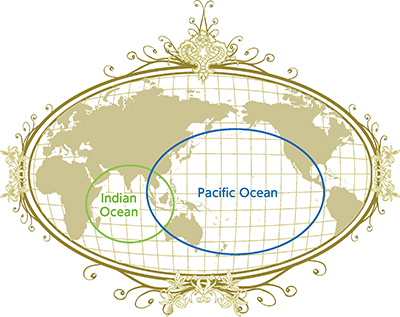
“A vast expanse of sea stretches from the Pacific Ocean to the Indian Ocean. Since ancient times the people of this region have enjoyed affluence and prosperity from this large and free body of water. Freedom of navigation and the rule of law form their bedrock. We must ensure that these waters are a public good that brings peace and prosperity to all people without discrimination into the future.”
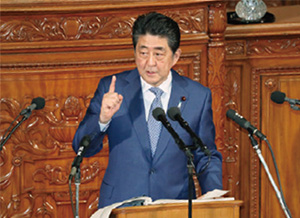 Policy Speech by Prime Minister Abe to the 196th Session of the Diet January 2018 (Photo: Cabinet Public Relations Office)
Policy Speech by Prime Minister Abe to the 196th Session of the Diet January 2018 (Photo: Cabinet Public Relations Office)Japan's Vision for FOIP
Shift in the global power balance: an increasingly complex and uncertain world
● Continued stability and prosperity for people across the region cannot be brought about by force or coercion, but only by maintaining and reinforcing the rules of the international community so as to secure the international order.
● It is necessary to craft new rules to meet the challenges of a changing world and emerging needs.
The importance of the Indo-Pacific Ocean: “International public goods”
● Dynamism created by the confluence of the Pacific Ocean and the Indian Ocean is an engine of the economic growth of the entire world.
● The international community as a whole will benefit from the maintenance and reinforcement of the rules-based order in the Indo-Pacific region.
FOIP is an open and inclusive concept
● The concept of FOIP does not intend to create new institutions or compete with existing institutions.
● No single country can maintain or enhance the rules-based international order alone. Japan works with a broad range of partners who share the vision of FOIP; no country is excluded from partnership.
Japan's efforts and cooperation toward FOIP
● Promoting policy on maritime order and sharing insights on maritime law with the international community
● Rule-making to expand a free and fair economic area (TPP11 Agreement, Japan-EU EPA, Japan-U.S. Trade Agreement, Japan-U.S. Digital Trade Agreement, etc.)
● Enhancing connectivity over the Indian Ocean and the Pacific Ocean (“G20 Principles for Quality Infrastructure Investment,” development of the East-West and Southern Economic Corridors in Southeast Asia, etc.)
● Enhancing governance (capacity building assistance in fiscal policy and public debt management, etc.)
● Ensuring maritime security and marine safety (providing equipment and human resource development for maritime law enforcement in Southeast Asian coastal countries, etc.)
Maritime order
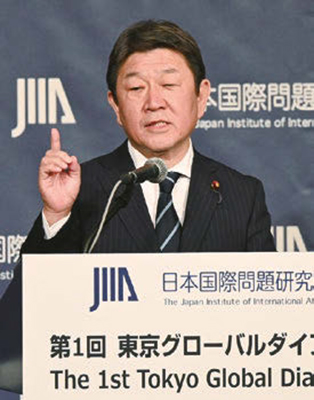 Foreign Minister Motegi advocating the importance of maintenance and reinforcement of the marine order at the 1st Tokyo Global Dialogue (December 2019, Tokyo)
Foreign Minister Motegi advocating the importance of maintenance and reinforcement of the marine order at the 1st Tokyo Global Dialogue (December 2019, Tokyo)Rule-making to expand a free and fair economic partnership
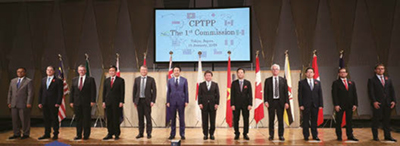 Comprehensive and Progressive Agreement for Trans-Pacific Partnership (TPP11 Agreement) ─The 1st TPP Commission in January 2019, Tokyo (Photo: Cabinet Public Relations Office)
Comprehensive and Progressive Agreement for Trans-Pacific Partnership (TPP11 Agreement) ─The 1st TPP Commission in January 2019, Tokyo (Photo: Cabinet Public Relations Office) Signing of the Joint Statement on Japan-U.S. Trade Agreement and Japan-U.S. Digital Trade Agreement (September 2019, U.S.; Photo: Cabinet Public Relations Office)
Signing of the Joint Statement on Japan-U.S. Trade Agreement and Japan-U.S. Digital Trade Agreement (September 2019, U.S.; Photo: Cabinet Public Relations Office)Enhancing connectivity between the Indian Ocean and the Pacific Ocean
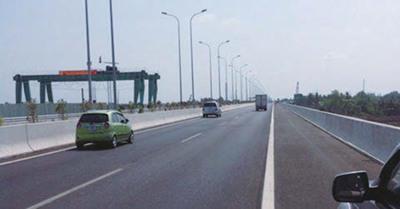 North-South Highway in Viet Nam (Photo: JICA)
North-South Highway in Viet Nam (Photo: JICA)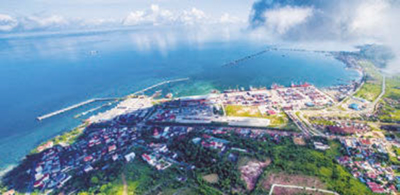 Sihanoukville Port in Cambodia (Photo: JICA)
Sihanoukville Port in Cambodia (Photo: JICA)Efforts and Cooperation on FOIP in Other Countries and Regions
In collaboration with FOIP-related activities of partners, Japan promotes the vision of FOIP by evoking a sense of ownership based on each vision, with a shared belief in the fundamental principles such as the rule of law.
UK
● Strengthening cooperation on (i) maritime security, (ii) quality infrastructure, and (iii) cyber security including 5G (Japan-UK Summit Meeting in January 2019)
France
● “France and Security in the Indo-Pacific” (Published in June 2018, revised in May 2019)
● Agreed to materialize cooperation mainly on the three pillars of (i) freedom of navigation and maritime security, (ii) climate change, the environment and biodiversity, and (iii) quality infrastructure (Japan-France Summit Meeting in June 2019)
Germany
● Confirmed cooperation toward achievement of FOIP (Japan-Germany Summit Meeting in February 2019)
Italy
● Agreed to work together to develop concrete cooperation for maintaining and strengthening FOIP (Japan-Italy Summit Meeting in April 2019)
European Union (EU)
● “Connecting Europe & Asia: The EU Strategy” (September 2018)
● Agreed to cooperate toward improving the connectivity between Europe and the Asia-Pacific region (Japan-EU Summit in April 2019)
● Prime Minister Abe attended “the Europa Connectivity Forum.” Signed “The Partnership on Sustainable Connectivity and Quality Infrastructure between Japan and the European Union” (September 2019)
Pacific Island countries
● PIF (Pacific Islands Forum) leaders welcomed Japan's contribution through “Free and Open Indo-Pacific Strategy” (PALM8* in May 2018)
* The 8th Pacific Islands Leaders Meeting
Association of Southeast Asian Nations (ASEAN)
● Announced “ASEAN Outlook on the Indo-Pacific” (AOIP) (June 2019)
● The leaders shared the view to promote a rules-based Indo-Pacific region that is free and open. Welcomed Japan's explicit support of AOIP, and encouraged Japan to undertake cooperation with ASEAN in the key areas outlined in AOIP (Chairman's Statement of the ASEAN-Japan Summit in November 2019)
India
● “Act East” policy
● Published “India-Japan Development Cooperation in the Indo-Pacific” (Japan-India Summit Meeting in October 2018)
● Published “Indo-Pacific Oceans Initiative” (November 2019)
Australia
● The leaders affirmed that the two countries share a vision for a free and open Indo-Pacific, and shared the view on working together for regional stability and prosperity (Japan-Australia Summit Meeting in November 2018).
● “A free, open, inclusive and prosperous Indo-Pacific” (Prime Minister Morrison's foreign policy speech in June 2019). Promote “Pacific Step-up” in the Pacific Island region.
Canada
● Agreed to further strengthen the strategic partnership under the vision of FOIP (Japan-Canada Summit Meeting in August 2019)
U.S.
● Announced concrete cooperation to maintain and reinforce FOIP (Japan-U.S. Summit Meeting in September 2018, visit of Vice President Pence to Japan in November 2018, Japan-U.S. Summit Meeting in May 2019)
● Published “Indo-Pacific Strategy Report” (June 2019) and “A Free and Open Indo-Pacific: Advancing a Shared Vision” (November 2019)
Mekong countries
● Published “Mekong-Japan Cooperation Projects in Synergy with Japan's policy to realize a free and open Indo-Pacific” (Mekong-Japan Summit Meeting in October 2018)
● The Mekong countries welcomed Japan's commitment to support the efforts made by the Mekong countries in line with the ASEAN Outlook on the Indo-Pacific (AOIP) (Joint Statement of the Mekong-Japan Summit in November 2019)
New Zealand
● Agreed to materialize the partnership in achieving FOIP in coordination with New Zealand's “Pacific Reset” policy regarding the Pacific Island region (Japan-New Zealand Summit Meeting in September 2019)
Red: Efforts of each country/region Blue: Cooperation between each country/region and Japan
